Verdict
Grado has knocked it out of the park with the GW100x, a terrific pair of wireless on-ears with an expressive audio performance, long battery life and better comfort than you might expect from an on-ear. If you want the best-sounding wireless on-ear performance, these are currently our top recommendation.
Pros
- More comfortable than you might expect
- Energetic, lively, and engaging sound
- Long battery life
- Very good call quality
Cons
- Not the best noise-isolation
- Patchy wireless performance in busy areas
-
4th Gen X driverRedesigned 44mm driver units -
Battery life46 hours of battery life -
BluetoothSBC, AAC, and aptX Adaptive codecs
Introduction
I can’t help but admire Grado’s persistence. While noise-cancelling over-ears are hugely popular, the GW100x shows the Brooklyn-based company is not one for chasing the mainstream route.
The Grado GW100x are neither the over-ears commonly seen on commutes, nor is there any interest in supporting noise-cancelling (which would be hard for an on-ear to do anyway). It doesn’t have a ‘Pro’ or ‘Max’ in the name, just an ‘x’, which hopefully signifies the X factor.
The GW100x aren’t the most convenient for outdoor use, but they do offer a terrific audio performance that warrants closer inspection.
Design
- Design leaks noise in from the outside
- Comfortable to wear
- Simple to use
Like the original GW100, the Grado GW100x aren’t the most practical pair of headphones outside the home. They’re almost antithetical for use in public spaces.
Why? Well, the GW100x have both an on-ear and open-backed design, both of which aren’t renowned for their noise-isolating properties to filter sounds away when you’re in the midst of a music session.
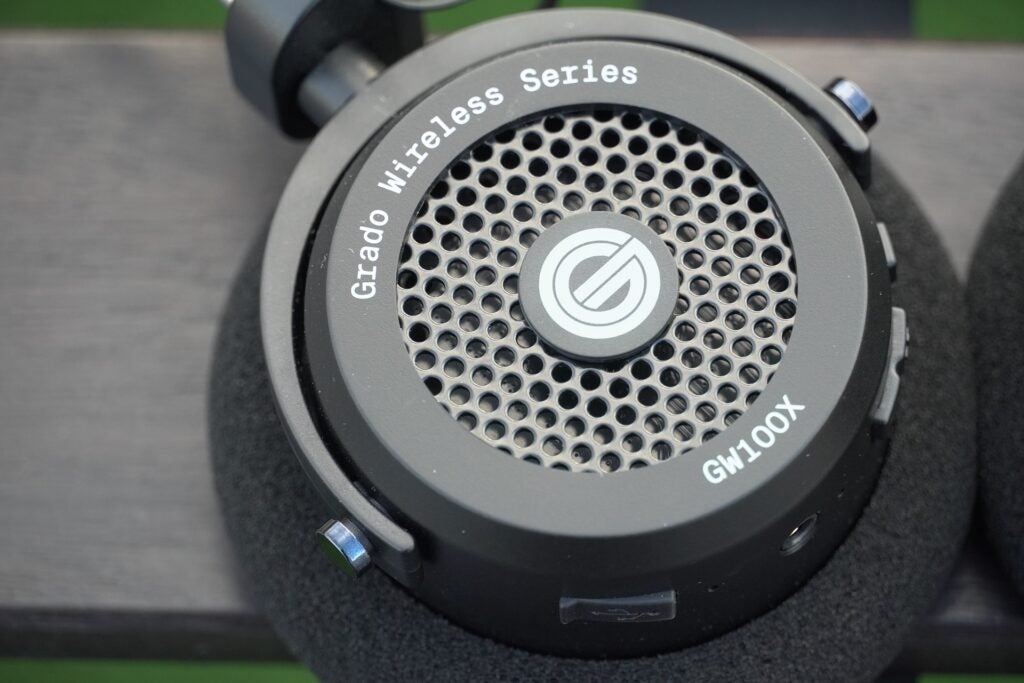
The on-ear design means external noises filter through – when it gets really loud on the Victoria and Jubilee line it becomes hard to hear anything. On an overground train they’re fine, and walking through London, they’re ok, but these headphones aren’t built to handle loud environments.
The open-backed design (the perforated grille on the earcups) has the opposite effect of leaking the audio to the world outside. However, Grado says they’ve taken steps to reduce the amount of sound that escapes by up to 60% compared to their wired headphones. A benefit of the open-back design is that it widens the soundstage, more than you would normally hear on a closed-back, over-ear design.
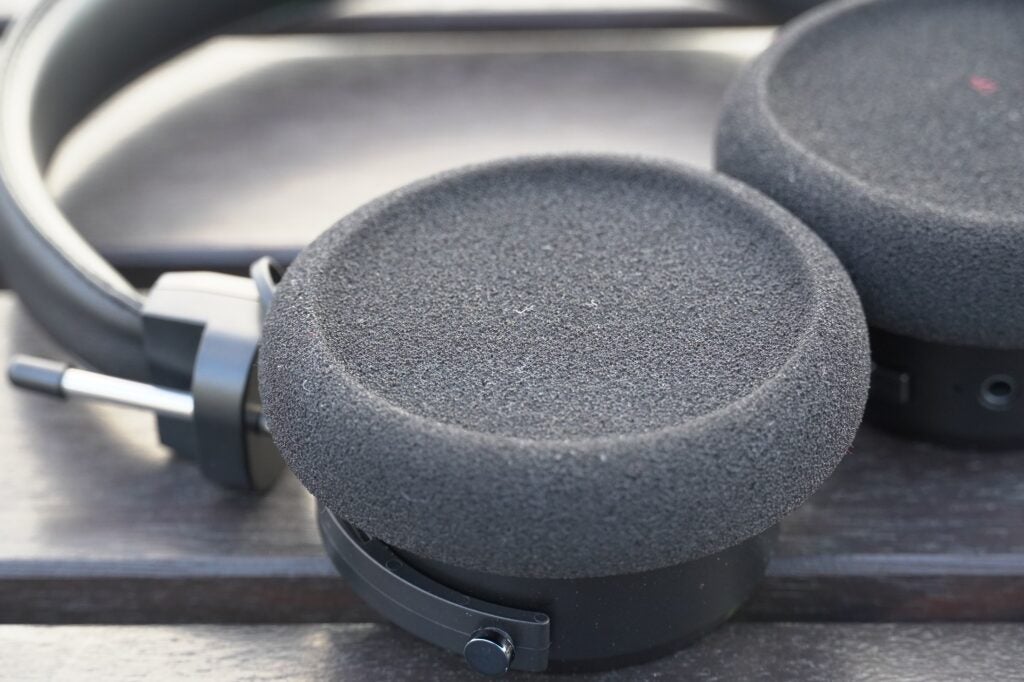
Just to further add to the lack of practicality, there’s no carry case, so if you’re taking these headphones on long journeys, they are either being stuffed in a bag or going around the neck.
Despite that, the Grado GW100x pretty much nail the other areas of the design brief. They are the most comfortable wireless on-ears I’ve worn in some time. The Grado’s WS Cushion (which can be swapped out and replaced) does heat my ears up but never to the point where it becomes uncomfortable.
While the clamping force is tight, it’s also not to the point where the headphones pinch on the earlobes. It’s the right level of tension to keep them affixed to the head, and at about 188g, they’re a lightweight pair.
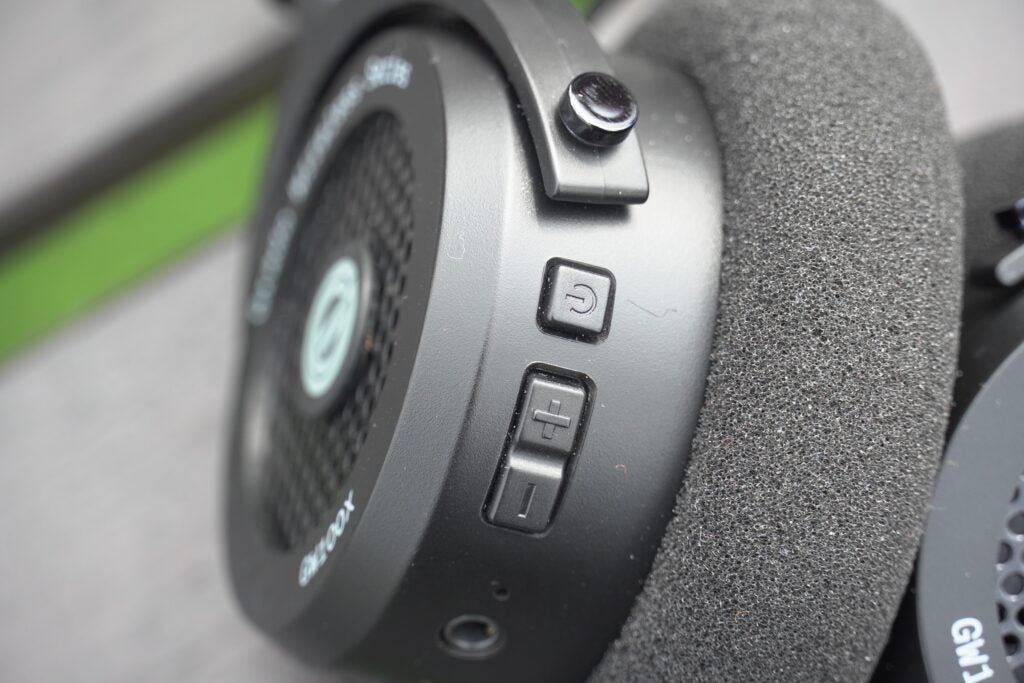
Onboard buttons are kept to the bare minimum: a multi-function button for power, playback, and Bluetooth pairing, plus volume buttons that also double up as track skipping forwards and backwards (with a long press). The 3.5mm jack is retained (cable included in the packaging), but the GW100’s micro-USB port receives a welcome upgrade to USB-C.
Features
- Long battery life
- aptX Adaptive Bluetooth support
- Clear voice quality
Features aren’t usually numerous for a pair of on-ears – the Sony WH-CH520 are the most feature packed I’ve come across with their EQ, Bluetooth multipoint, and other customisation possibilities. However, what you see is what you get from the Grado GW100x.
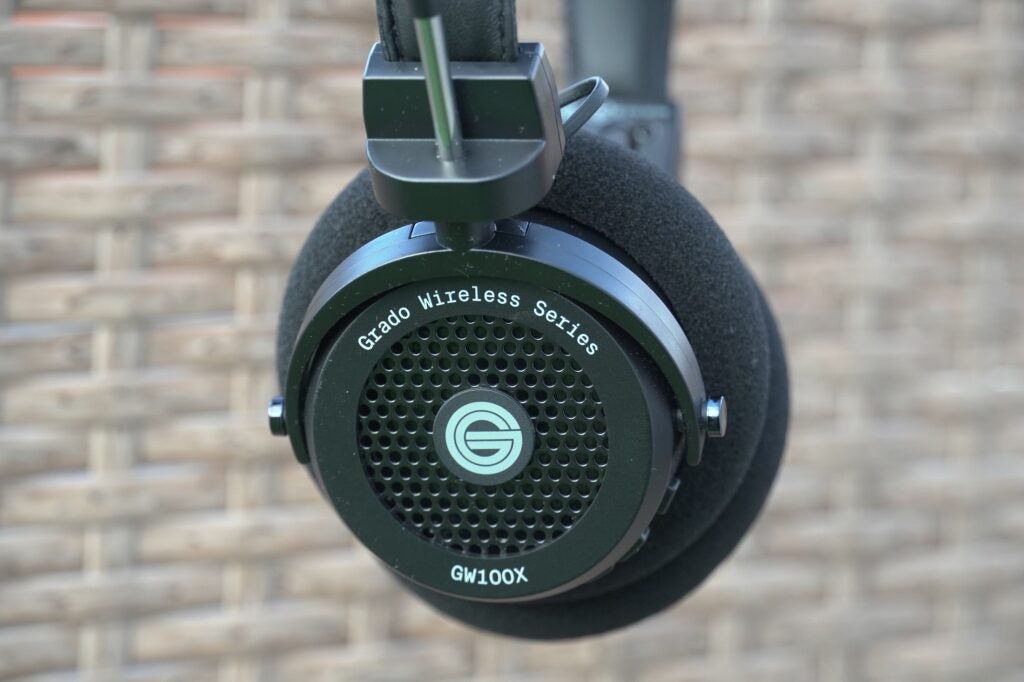
There’s no app to fiddle with, no firmware updates or battery level to check unless you’re looking at the icon on your mobile device. Bluetooth support is version 5.2, and dropouts were frequent at Victoria train station. That’s a surprise considering the headphones support Bluetooth codecs up to aptX Adaptive, which is intended to provide a stable connection in busy signal areas. Those with iOS devices will only be able to benefit from AAC streaming.
The performance with calls was a more positive surprise in light of its open-back design. Voices are intelligible and clear on both ends, and background noise is kept to a minimum in most situations. It’s only when it became really loud that it was harder for my voice to penetrate through the noise.
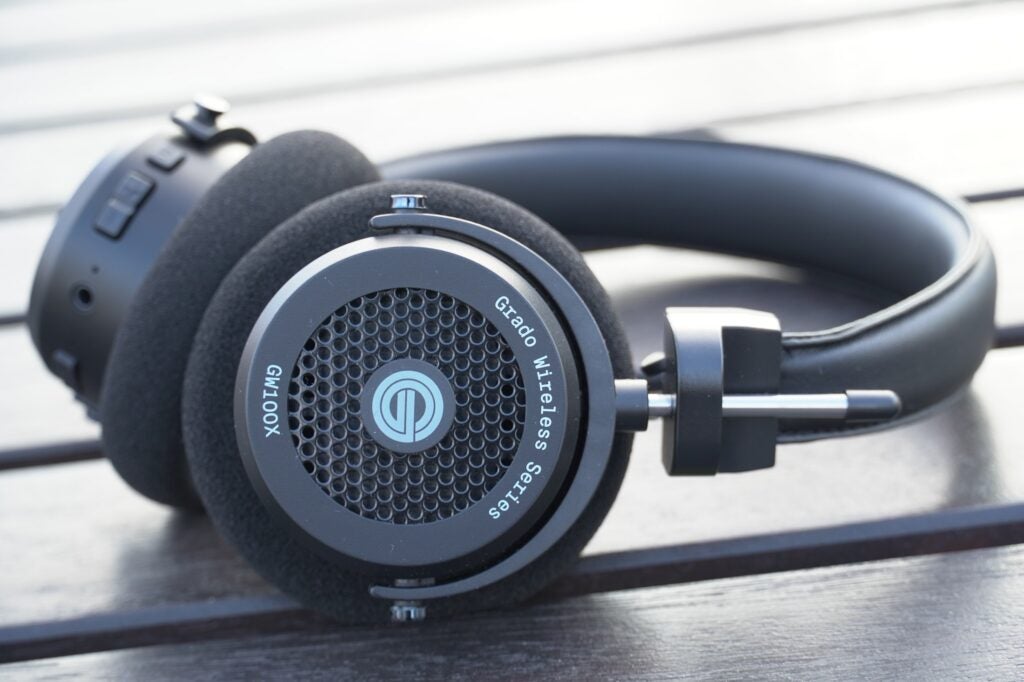
Stamina is excellent. These headphones feel as if they can go on and on at default volume (which, happily, is quite loud). An 11-hour battery drain only saw them fall to 80%, so there should be at least 50 hours to enjoy before a recharge is needed.
Sound Quality
- Energetic sense of dynamism
- Firm bass, bright highs
- Wide soundstage
Compared to the original GW100, the Grado GW100x play louder at similar volume levels, and that immediately gives them more impact. The tuning of the 4th Gen X Driver has had a few changes too with the midrange slightly crisper, and bass more pronounced.
There’s more energy, dynamism, and drive to the GW100x’s performance, and its midrange clarity has the excellent effect of separating and isolating vocals from the rest of a track, giving them more space to breathe.
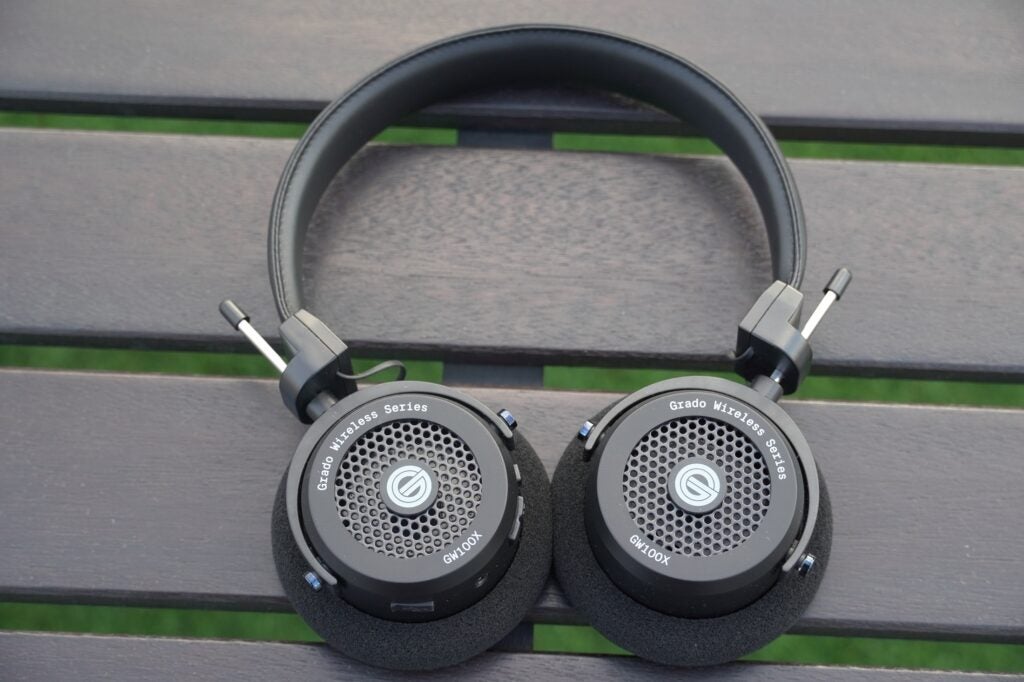
The top end of the frequency range is bright and there’s a degree of warmth to the low frequencies with a decent bass output for an on-ear pair. Compared to the Grado GW100, the GW100x is clearer and more defined in how it deals with bass.
There’s a propulsive flow the Grados give to Porno Graffiti’s Melissa that captures the track’s bouncy energy. The percussive hits of the drum hit cleanly and punchily, and while there’s perhaps not the utmost sense of detail and definition to instruments, the tone and character of each instrument is well described.
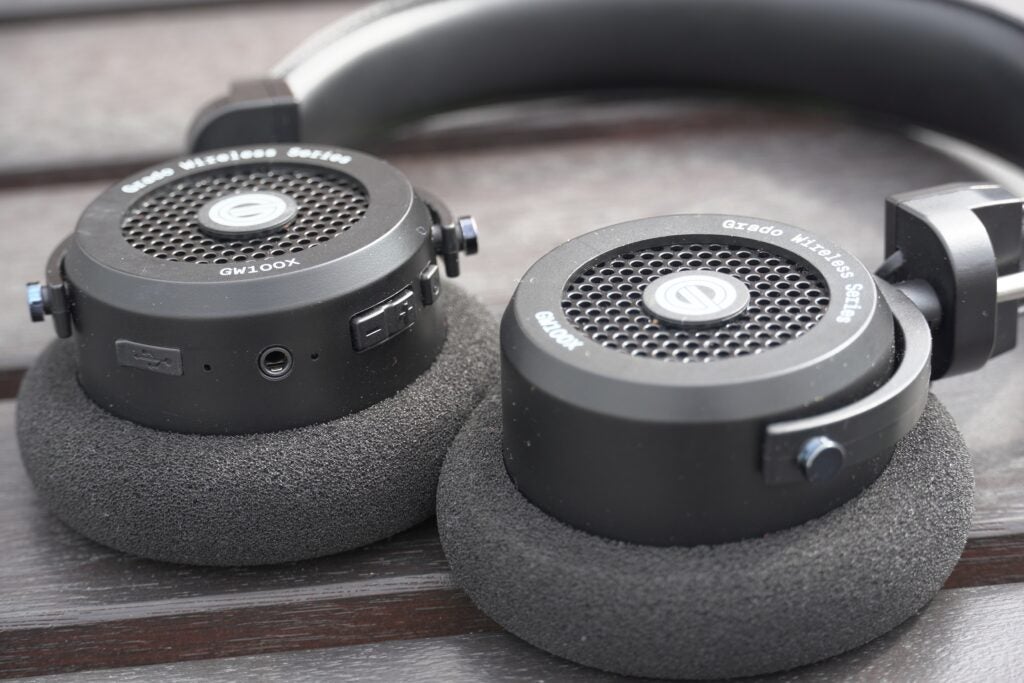
The width of the soundstage allows for music tracks to be spread wide. With Stay High (Childish Gambino version), it’s a track painted on a big canvas, Gambino’s vocals planted in the centre with backing vocals out towards the edges. With a soundstage this big it feels as immersive as you can get without listening to spatial audio tracks such as Dolby Atmos and Sony’s 360 Reality Audio.
That track is also a good example of the GW100x’s reach in terms of brightness with high frequency notes, presenting them with enough shine and clarity to give them impact, but not to the point they’re either grating or distorted.
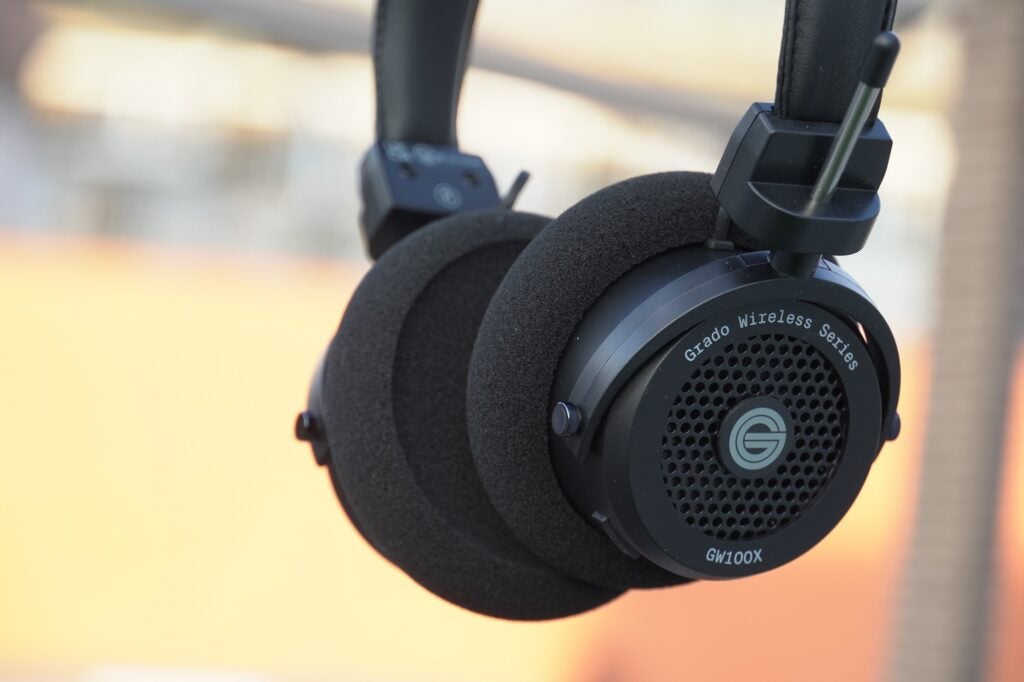
There’s good variation in GoGo Penguin’s Raven that depicts each hit of the piano key well, whereas with some headphones the piano keys can meld into one. That’s further reinforced by a play of Andreas Ihlebæk’s Come Summer, in which the Grado captures the variety of keystrokes with a rich sense of brightness.
The tuning of the Grado GW100x ensures they’re a great listen across a variety of tracks, but if I had to nit-pick, it’s that the warmth of the GW100x’s presentation that doesn’t produce high levels of detail and fidelity. It is a nit-pick as the Grados are enormously enjoyable, radiating energy, dynamism, and power for a lively and engaging listen.
Latest deals
Should you buy it?
You should buy for the excellent audio performance: I haven’t heard an on-ear that sounds as good as the Grado GW100x. They’re a terrifically expressive and dynamic performer.
You should not buy if you hate interruptions from the outside world: The Grado’s lack of protection from the outside world means it’s good enough for most commutes, although it won’t survive the loudest parts of the Underground.
Final Thoughts
The design carries its drawbacks, which doesn’t make the Grado GW100x most suited to outdoor use, but is that as big a disadvantage? I see plenty of commuters wearing on-ear or even open-eared headphones like AirPods and Shokz, so there are some more than fine dealing with some noise leakage.
If that describes you then the Grado GW100x are one of the best-sounding wireless on-ears around, an expressive pair of headphones with an expansive soundstage, firm bass and enjoyable sense of energy and dynamism. They’re a cracking listen.
The wireless performance could stand to be less flaky in busy signal areas, especially with its aptX Adaptive support; but elsewhere they’re one of the more comfortable on-ears I’ve worn, call quality is surprisingly good, and the battery life will keep these headphones going for days. Grado has knocked it out of the park with the GW100x. Check out our Best Headphones list for even more options.
How we test
We test every set of headphones we review thoroughly over an extended period of time. We use industry standard tests to compare features properly. We’ll always tell you what we find. We never, ever, accept money to review a product.
Find out more about how we test in our ethics policy
Tested for several months
Battery drain test performed
Tested with real world use
FAQs
There’s no Bluetooth multipoint support with these headphones, so you can only connect them to one device at a time.

























